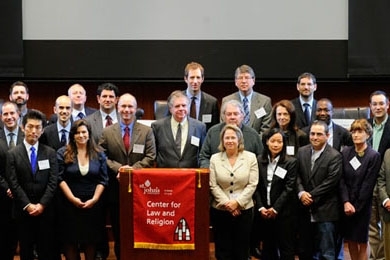

Contemporary law and religion scholarship has moved beyond traditional domestic church-state questions. Taking a comparative approach, professors examine how different countries try to balance government interests and the claims of religious believers. Scholars also focus on religious law itself, exploring similarities and differences among Christian, Jewish, and Islamic jurisprudence.
These new trends were evident at the Center for Law and Religion’s recent Religious Legal Theory Conference. Now in its second year, the Conference drew an impressive group of law and religion scholars from around the world. Steven Smith of the University of San Diego and Steven Shiffrin of Cornell offered engaging plenary papers, and panels addressed a range of topics, including American Law and Religion; Biblical Law; Comparative Law and Religion; Duties of Judges, Lawmakers, and Citizens; Religious Legal Theory; and Religious Conceptions of Law and Loyalty. Papers will appear in a future issue of the St. John’s Law Review.
According to the Center’s Director, Professor Mark L. Movsesian, the Conference provided a great opportunity for faculty and students alike. “There’s a lot of interesting work being done right now in law and religion,” he said. “As part of a global University, it’s only natural for the Center to take an interest in law and religion scholarship as it evolves locally, nationally, and around the world.”
“It was great to see scholars engage in this kind of respectful dialogue on law and religion,” said Yosefa Heber ’13. “The mix of panel discussions deepened my understanding of diverse religious legal philosophies and made the Conference a unique learning experience.” Dean Michael A. Simons added, “The Conference exemplifies the open exchange of ideas on important world issues that lies at the heart of St. John’s mission as a community of teachers and scholars.”
Established in 2010, the Center for Law and Religion provides a forum for the study of law and religion from domestic, international and comparative perspectives. In addition to hosting conferences and speakers from academia and public life, it coordinates the Law School’s law and religion curriculum and promotes dialogues among scholars with different viewpoints, both religious and non-religious. For more information about the Center, please contact Professor Movsesian at [email protected].
